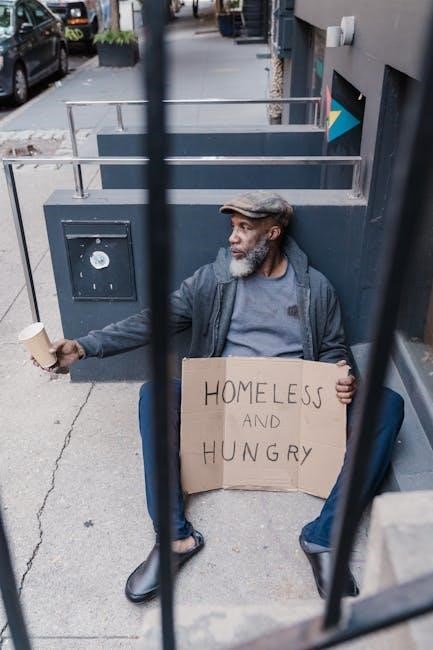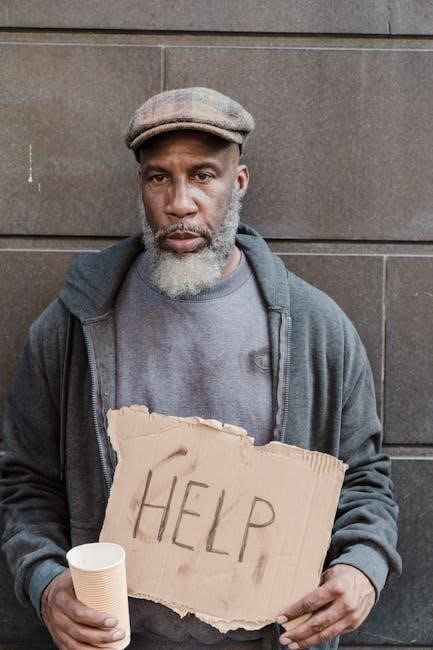Evicted: Poverty and Profit in the American City is a groundbreaking exploration of housing insecurity‚ revealing how eviction perpetuates poverty and inequality in urban America.
Overview of “Evicted: Poverty and Profit in the American City”
Evicted: Poverty and Profit in the American City by Matthew Desmond is a Pulitzer Prize-winning book that examines the intersection of housing insecurity‚ poverty‚ and exploitation in urban America. Through ethnographic research‚ Desmond follows eight families in Milwaukee‚ documenting their struggles with eviction and housing instability. The book reveals how eviction is not merely a symptom of poverty but a cause‚ perpetuating cycles of inequality. Desmond’s work combines storytelling with policy analysis‚ offering insights into the systemic failures of the housing market and advocating for solutions like universal housing vouchers. This powerful narrative sheds light on the human cost of eviction and its broader societal implications.
Author Matthew Desmond and His Research
Matthew Desmond‚ a renowned sociologist and MacArthur “Genius” grant recipient‚ is the author of Evicted: Poverty and Profit in the American City; His research focuses on urban poverty‚ inequality‚ and housing insecurity. Desmond conducted extensive fieldwork in Milwaukee‚ living alongside tenants and landlords to document the eviction process. His work reveals the systemic exploitation of low-income renters and the profound impact of eviction on families. Desmond is also the founder of The Eviction Lab‚ which tracks eviction data nationwide. His research has significantly influenced public discourse on housing policy and social justice‚ earning him numerous accolades‚ including the Pulitzer Prize.
The Importance of Understanding Housing Insecurity
Understanding housing insecurity is crucial for addressing the cyclical nature of poverty in America. Eviction disrupts lives‚ forcing families into unstable living conditions‚ which can lead to job loss‚ poor health‚ and educational setbacks. It perpetuates inequality‚ as low-income individuals and minorities are disproportionately affected. Recognizing the systemic causes of housing insecurity‚ such as unaffordable rent and lack of legal protections for tenants‚ is essential for developing effective solutions. Desmond’s work highlights the need for comprehensive policies to ensure stable housing‚ a fundamental human right‚ and to break the cycle of poverty that eviction perpetuates. This understanding is vital for creating a more equitable society.

The Causes of Eviction
Economic inequality‚ unaffordable housing‚ and profit-driven landlord practices are key drivers of eviction‚ exacerbated by legal systems favoring property owners over tenant rights.
Economic Inequality and Poverty in America
Economic inequality and poverty are central drivers of housing insecurity in America. Many low-income families spend over 70% of their income on rent‚ leaving little for essentials like food and healthcare. This financial strain makes it difficult to recover from unexpected expenses‚ leading to missed payments and eventual eviction. Desmond’s research highlights how poverty is not just a lack of resources but also a result of systemic exploitation‚ where the poor are charged more for basic necessities‚ trapping them in a cycle of debt and housing instability. This cycle perpetuates inequality‚ making it nearly impossible to escape poverty.
Housing Shortages and Unaffordable Rent
Housing shortages and rising rents exacerbate the housing crisis‚ pushing low-income families to the brink of eviction. With limited affordable options‚ many are forced to pay exorbitant rates‚ leaving little for other necessities. Desmond’s research shows that in cities like Milwaukee‚ the demand for affordable housing far exceeds supply‚ creating a competitive market where landlords can charge high rents despite poor living conditions. This imbalance traps families in a cycle of housing insecurity‚ making eviction a constant threat. The lack of affordable housing options is a critical factor in perpetuating poverty and homelessness in urban America.
The Role of Landlords and Profit-Driven Housing Markets
Landlords in profit-driven housing markets often prioritize financial gain over tenant welfare‚ exacerbating housing insecurity. Desmond’s research highlights how landlords exploit low-income tenants‚ charging high rents for substandard housing. The pursuit of profit leads to aggressive eviction practices‚ as landlords seek to minimize vacancies and maximize returns. This dynamic creates a power imbalance‚ where tenants are at the mercy of landlords who often disregard their rights. The profit motive in the rental market perpetuates cycles of poverty and eviction‚ leaving vulnerable populations with little recourse or stability. This systemic issue underscores the need for reforms to protect tenants and ensure affordable housing.
Legal and Systemic Barriers for Tenants
Tenants face significant legal and systemic barriers that make it difficult to avoid eviction. Many lack legal representation‚ leaving them vulnerable in court proceedings dominated by landlords with legal resources. Additionally‚ tenant protections are often weak or inconsistently enforced‚ allowing landlords to evict with little justification. The legal system disproportionately favors property owners‚ perpetuating housing insecurity. These barriers trap low-income families in cycles of poverty and instability‚ as evictions exacerbate existing social and economic challenges. Addressing these systemic inequalities is crucial to creating a fairer housing market and ensuring stable living conditions for all residents. Reforming eviction laws and strengthening tenant protections are essential steps forward.

The Impact of Eviction on Individuals and Families
Eviction causes severe trauma‚ disrupting lives and destabilizing families. It forces children to change schools‚ harming their education‚ while adults face job loss and reduced stability.
Eviction as a Traumatic Experience
Eviction is not just a legal process but a deeply traumatic experience that causes emotional and psychological distress; Many individuals experience it as a profound sense of rejection and shame‚ exacerbating feelings of powerlessness. The sudden loss of a home disrupts families‚ forcing children to change schools and adults to lose job stability. Desmond’s research highlights how eviction perpetuates cycles of poverty‚ leaving lasting scars on mental health and social well-being. The trauma of eviction is compounded by the stigma attached to it‚ making it harder for individuals to rebuild their lives. This experience underscores the human cost of housing insecurity in America.
Disruption of Education and Employment
Eviction often results in the disruption of education and employment‚ further entrenching poverty. Children forced to move frequently are more likely to fall behind academically‚ as constant school changes hinder their ability to maintain consistent learning. Adults‚ meanwhile‚ may lose their jobs due to the instability and stress caused by eviction‚ making it harder to secure new employment. This cycle of disruption exacerbates financial instability‚ creating a ripple effect that impacts entire families. Desmond’s research underscores how housing insecurity destabilizes both educational opportunities and economic stability‚ perpetuating a cycle that is difficult to escape. These disruptions highlight the profound consequences of eviction beyond just losing a home.
Health Consequences of Housing Insecurity
Housing insecurity has severe health consequences‚ exacerbating physical and mental health challenges. Eviction often leads to increased stress‚ anxiety‚ and depression‚ as individuals and families face uncertainty and instability. Poor living conditions in overcrowded or substandard housing can contribute to the spread of illnesses and exacerbate chronic health issues. Additionally‚ the disruption caused by eviction can limit access to healthcare services and medications. Desmond’s work highlights how housing insecurity creates a cycle of vulnerability‚ where health struggles further entrench poverty. The physical and emotional toll of eviction underscores its broader impact on well-being‚ revealing how unstable housing conditions can have far-reaching health consequences for individuals and families.
Inter generational Effects of Poverty and Eviction
Poverty and eviction create long-lasting‚ intergenerational cycles of disadvantage. Children exposed to housing instability often face developmental delays and educational disruptions‚ limiting their future opportunities. Families repeatedly evicted struggle to establish stability‚ perpetuating cycles of poverty. Desmond’s research shows eviction’s impact extends beyond individuals‚ affecting generations. Parents’ financial and emotional stress can hinder children’s cognitive development and aspirations. This cycle perpetuates inequality‚ trapping families in poverty and limiting social mobility. Addressing eviction is crucial to breaking these cycles and ensuring future generations can escape the legacy of instability and economic hardship. The intergenerational effects highlight the urgent need for systemic change to prevent this cycle from continuing unchecked.

The Role of Landlords in the Housing Crisis
Landlords often prioritize profit over tenant welfare‚ contributing to housing insecurity and high eviction rates‚ as highlighted in Desmond’s research on urban housing markets.
Landlord-Tenant Power Dynamics
The relationship between landlords and tenants is deeply unequal‚ with landlords holding significant power over housing stability. Tenants often face limited legal protections‚ making them vulnerable to exploitation. Desmond highlights how landlords prioritize profit‚ sometimes exploiting tenants through unfair practices. This dynamic perpetuates housing insecurity‚ as tenants fear challenging landlords due to the threat of eviction. The imbalance is further exacerbated by systemic issues‚ such as the lack of legal representation for tenants. Desmond argues that this power imbalance is a root cause of eviction and cycles of poverty‚ emphasizing the need for systemic change to protect tenants’ rights and stability.
The Business Model of Rental Properties
The rental property business thrives on maximizing profits‚ often at the expense of tenant well-being. Landlords frequently charge high rents while minimizing maintenance costs‚ leading to substandard living conditions. Desmond illustrates how this model exploits low-income tenants‚ who spend a disproportionate amount of their income on rent. The pursuit of profit incentivizes landlords to evict tenants for even minor lease violations‚ perpetuating housing insecurity. This business approach prioritizes financial gain over tenant stability‚ contributing to cycles of poverty and eviction. The model is deeply ingrained in the housing market‚ making systemic change essential to address the root causes of housing insecurity.
Legal and Financial Incentives for Eviction
Eviction is often driven by legal and financial incentives that favor landlords over tenants. Laws in many states make it relatively easy for landlords to evict tenants‚ even for minor infractions‚ creating a power imbalance. Financially‚ landlords may find it more profitable to evict tenants rather than negotiate payment plans‚ as vacant units can be rented at higher rates. Desmond highlights how eviction has become a business strategy‚ with some landlords relying on eviction fees and court costs to increase profits. This system perpetuates housing insecurity‚ as tenants are left with few legal protections and face significant financial burdens. The legal framework often prioritizes property rights over human needs‚ exacerbating the eviction crisis.

Case Studies from Milwaukee
Matthew Desmond’s Evicted shines a light on eight Milwaukee families struggling to maintain housing stability‚ vividly illustrating the human cost of poverty and eviction in America.
The Stories of Eight Families in Milwaukee
Matthew Desmond’s Evicted delves into the lives of eight Milwaukee families‚ exposing the harsh realities of housing insecurity; Through intimate storytelling‚ Desmond reveals how eviction disrupts lives‚ forcing families into cycles of poverty. The families’ struggles highlight systemic issues like unaffordable rent‚ discriminatory practices‚ and inadequate social support. Desmond’s fieldwork captures the emotional toll of eviction‚ from children changing schools repeatedly to parents losing jobs due to instability. These narratives underscore eviction as a cause‚ not just a symptom‚ of poverty. Desmond also explores potential solutions‚ such as universal housing vouchers‚ to address this crisis. Their stories humanize the statistics‚ making the housing crisis relatable and urgent.
Racial and Socioeconomic Disparities in Housing
In Evicted‚ Matthew Desmond reveals how racial and socioeconomic disparities exacerbate housing insecurity. Black and Latino communities in Milwaukee face disproportionately high eviction rates due to systemic discrimination. Landlords often exploit these disparities‚ charging high rents for substandard housing. Desmond highlights how centuries of segregation and economic inequality have created a cycle of poverty‚ where marginalized groups struggle to access stable housing. The book underscores how race and class intersect‚ perpetuating housing insecurity and limiting opportunities for upward mobility. These disparities are not accidental but are rooted in historical and systemic exploitation‚ making housing insecurity a deeply ingrained issue in America.
The Intersection of Poverty‚ Race‚ and Eviction
Poverty‚ race‚ and eviction are deeply intertwined in America‚ as shown in Evicted. African American and Latino families face higher eviction rates due to systemic inequalities. Desmond reveals how racial discrimination in housing markets leads to overpriced‚ low-quality rentals. These communities are disproportionately affected by eviction‚ which perpetuates a cycle of poverty. The book highlights how race compounds economic hardship‚ creating barriers to stable housing. This intersectionality is not merely coincidental but a result of historical segregation and ongoing discrimination. Desmond’s research underscores the urgent need to address these interconnected issues to achieve true housing equity and social justice.

Policy Analysis and Potential Solutions
Desmond advocates for systemic change‚ proposing universal housing vouchers and stronger tenant protections. Policymakers must address root causes of housing insecurity through equitable solutions and increased funding for affordable housing.
Current Housing Policies and Their Limitations
Matthew Desmond’s research highlights the inadequacies of current housing policies‚ which often fail to address the root causes of eviction and poverty. Many programs‚ such as Section 8 housing vouchers‚ are underfunded and inaccessible to millions in need. Additionally‚ existing policies frequently overlook the systemic barriers faced by low-income renters‚ such as exorbitant rent increases and lack of legal protections. Desmond argues that without comprehensive reform‚ these limitations perpetuate cycles of housing insecurity. He emphasizes the need for universal housing vouchers and stronger tenant protections to create a more equitable system. Current policies fall short of addressing the scale and complexity of the housing crisis.
The Idea of Universal Housing Vouchers
Matthew Desmond proposes universal housing vouchers as a potential solution to the eviction crisis‚ ensuring that all low-income families can afford stable housing. Unlike existing programs with limited eligibility‚ universal vouchers would provide broader access‚ reducing housing insecurity. Desmond argues this approach could significantly decrease eviction rates and break cycles of poverty. By covering rental costs‚ vouchers would alleviate financial strain on tenants and prevent landlords from evicting for non-payment. This policy aligns with Desmond’s vision of addressing housing as a human right‚ offering a practical step toward systemic change and fostering economic mobility for vulnerable populations.
Community-Based Solutions to Housing Insecurity
Community-based initiatives are vital in addressing housing insecurity‚ as highlighted in Desmond’s work. Local organizations and coalitions can provide emergency rental assistance‚ legal aid‚ and tenant education. These efforts empower renters to navigate eviction processes and assert their rights. Grassroots movements also advocate for policy reforms‚ such as rent control and tenant protection laws. By fostering collaboration among residents‚ activists‚ and policymakers‚ community-based solutions create sustainable change. Desmond emphasizes the importance of involving affected communities in developing solutions‚ ensuring their voices shape policies that directly impact their lives and housing stability.
The Role of Government in Addressing the Crisis
The government plays a crucial role in combating housing insecurity‚ as outlined in Desmond’s research. Federal and local policies can expand affordable housing options‚ strengthen tenant protections‚ and provide financial assistance. Implementing universal housing vouchers and increasing funding for public housing programs are key strategies. Additionally‚ enforcing stricter regulations on eviction practices and ensuring legal representation for tenants can help level the playing field. Desmond underscores the need for systemic change‚ advocating for policies that prioritize housing as a human right rather than a commodity. By taking proactive measures‚ governments can mitigate the cyclical nature of poverty and eviction.

The Broader Context of Urban Poverty
Urban poverty is rooted in systemic inequality‚ gentrification‚ and housing shortages‚ perpetuating cycles of displacement and economic disparity‚ as highlighted in Desmond’s detailed analysis.
Gentrification and Urban Development
Gentrification and urban development play a significant role in exacerbating housing insecurity‚ as affluent populations move into low-income neighborhoods‚ driving up rents and displacing long-time residents.
This process often results in the demolition of affordable housing units to make way for luxury developments‚ further limiting options for vulnerable populations and deepening inequality.
Desmond’s research highlights how such urban policies disproportionately affect marginalized communities‚ perpetuating cycles of poverty and eviction‚ as low-income families are priced out of their own neighborhoods.
The Decline of Affordable Housing Options
The decline of affordable housing options has intensified housing insecurity‚ particularly for low-income families. Rising rents and stagnant wages have made it increasingly difficult for tenants to afford basic shelter‚ pushing many to the brink of eviction.
Urban development and the conversion of low-income housing into luxury units have further reduced the availability of affordable housing. This trend forces families to allocate a larger portion of their income to housing‚ leaving little for other necessities and creating a cycle of financial strain.
Without sufficient government support or new affordable housing construction‚ the gap between housing demand and supply continues to widen‚ exacerbating poverty and displacement.
The Relationship Between Poverty and Crime
Poverty and crime are deeply intertwined‚ with housing insecurity exacerbating this relationship. Eviction often leads to instability‚ forcing families into precarious living conditions that heighten vulnerability to criminal activity. The stress and trauma of displacement can contribute to mental health issues‚ substance abuse‚ and involvement in illegal activities. Additionally‚ neighborhoods with high eviction rates often experience over-policing‚ further criminalizing already marginalized communities. Desmond’s work highlights how systemic neglect and economic inequality create environments where crime thrives‚ perpetuating cycles of poverty and injustice. Addressing housing insecurity is thus crucial to reducing crime and fostering safer‚ more equitable urban environments.
Evicted reveals the harsh realities of housing insecurity‚ exposing how eviction perpetuates poverty and inequality. Desmond’s work calls for systemic change and offers hope for a more equitable future.
Matthew Desmond’s Evicted: Poverty and Profit in the American City examines the housing crisis through the lives of eight Milwaukee families‚ revealing how eviction perpetuates poverty. Desmond’s Pulitzer Prize-winning research highlights eviction as both a cause and a condition of poverty‚ disrupting education‚ employment‚ and health. Landlords profit from exploiting vulnerable tenants‚ while systemic inequalities and unaffordable housing trap families in cycles of instability. Desmond advocates for universal housing vouchers as a potential solution to address this crisis. His work underscores the urgent need for policy reform to protect tenants and ensure stable housing for all.
The Need for Systemic Change
Matthew Desmond’s Evicted: Poverty and Profit in the American City emphasizes the urgent need for systemic change to address housing insecurity. The current system prioritizes landlord profits over tenant stability‚ perpetuating cycles of poverty. Desmond argues that policies like universal housing vouchers could provide relief‚ but deeper structural reforms are necessary. Legal biases favor landlords‚ and the lack of affordable housing exacerbates inequality. Without addressing these root causes‚ eviction will continue to destabilize families and communities. The book calls for a reimagined housing system that values human dignity over economic gain‚ ensuring housing is a right‚ not a privilege.
Hope and Possibilities for the Future
While Evicted: Poverty and Profit in the American City exposes the harsh realities of housing insecurity‚ it also offers hope for transformative change. Desmond suggests that universal housing vouchers could alleviate financial burdens‚ reducing eviction rates. Community-based initiatives‚ such as tenant organizing and non-profit legal aid‚ demonstrate the power of collective action. Policy reforms‚ like rent control and stronger tenant protections‚ could shift the balance of power in housing markets. By addressing systemic inequities and fostering empathy‚ society can move toward a future where housing is a right‚ not a privilege. Desmond’s work inspires both reflection and action‚ urging readers to demand a more just system for all.
Additional Resources
Find Evicted: Poverty and Profit in the American City in PDF format on official publisher sites or academic platforms. Explore related books and organizations addressing housing insecurity.
Where to Find “Evicted: Poverty and Profit in the American City” in PDF
The PDF version of Evicted: Poverty and Profit in the American City can be accessed through official publisher websites‚ online retailers‚ or academic platforms. Visit Broadway Books or Crown Publishers for direct downloads. Additionally‚ platforms like JSTOR‚ ResearchGate‚ or university libraries often provide access. Some websites‚ such as Macaulay Cuny or Archive.org‚ may offer free PDF versions. Always ensure to use legitimate sources to respect copyright and support the author’s work. Purchasing the book or accessing it through verified platforms is recommended for the best reading experience.
Related Books and Research on Housing Insecurity
Besides Evicted: Poverty and Profit in the American City‚ Matthew Desmond’s work can be complemented by other books addressing housing insecurity. Desmond’s later work‚ Poverty‚ by America‚ critiques systemic poverty and its structures. Other notable books include Nickel and Dimed by Barbara Ehrenreich‚ exploring low-wage labor‚ and Evicted!: The Hidden Crisis of Tenant Screening by Alexandra K. Murphy. Research from The Eviction Lab‚ founded by Desmond‚ provides extensive data on eviction trends. These resources offer a deeper understanding of housing challenges‚ systemic inequality‚ and potential policy reforms to address urban poverty and tenant rights; They are essential for anyone seeking a comprehensive view of housing insecurity in America.
Organizations Working to Combat Eviction and Poverty
Several organizations are dedicated to addressing eviction and poverty‚ inspired by the insights from Evicted: Poverty and Profit in the American City. The Eviction Lab‚ founded by Matthew Desmond‚ conducts research and advocacy to reduce eviction rates. The National Coalition for the Homeless works to prevent homelessness through supportive services and policy reform. Local housing justice networks and tenant unions also play a crucial role in empowering renters and advocating for affordable housing. These organizations collaborate with policymakers‚ communities‚ and researchers to create sustainable solutions for housing insecurity and poverty‚ ensuring vulnerable populations have access to stable housing and economic opportunities.

Final Thoughts
Matthew Desmond’s work underscores the urgent need for systemic change to address poverty and housing insecurity‚ offering hope through collective action and policy reform for a brighter future.
The Lasting Impact of Desmond’s Work
Matthew Desmond’s Evicted: Poverty and Profit in the American City has left an indelible mark on public discourse‚ reshaping how society views housing insecurity and eviction. His Pulitzer Prize-winning work not only exposed the harsh realities faced by low-income families but also influenced policy discussions nationwide. By humanizing the struggles of tenants and landlords alike‚ Desmond’s research has inspired advocacy efforts and pushed for systemic change. The establishment of The Eviction Lab further amplifies his impact‚ providing critical data to address housing crises. Desmond’s work continues to resonate‚ advocating for equitable solutions and challenging America to confront the root causes of poverty and inequality.
Call to Action for Readers
Readers are urged to engage deeply with Matthew Desmond’s groundbreaking work‚ Evicted: Poverty and Profit in the American City‚ to understand the urgent need for housing reform. By exploring the lives of Milwaukee’s most vulnerable residents‚ Desmond challenges us to confront the systemic inequalities driving urban poverty. This powerful narrative demands action—advocate for policies like universal housing vouchers‚ support organizations combating eviction‚ and educate others about the crisis. Access the book in PDF format to delve into its critical insights and join the movement toward creating a more equitable society. Together‚ we can address the root causes of housing insecurity and foster lasting change.





